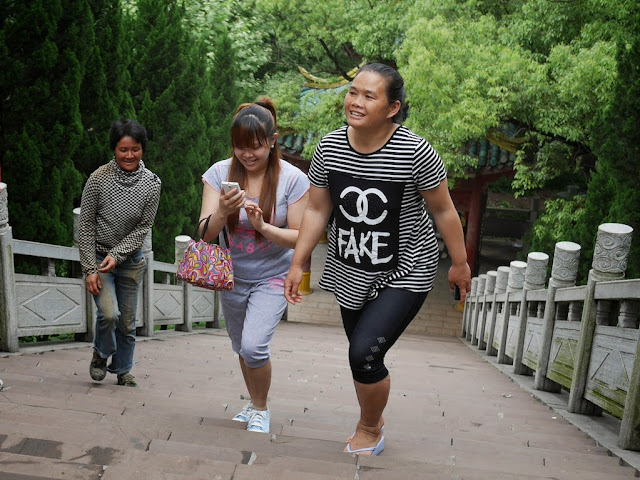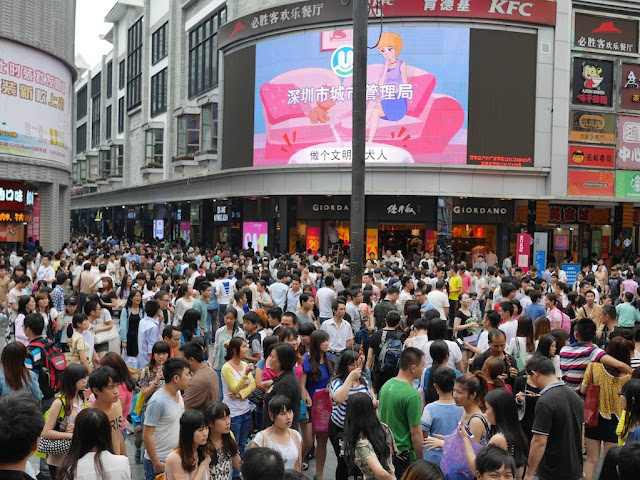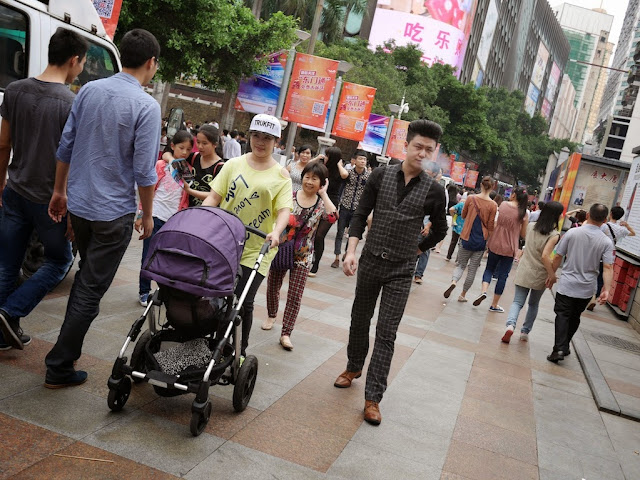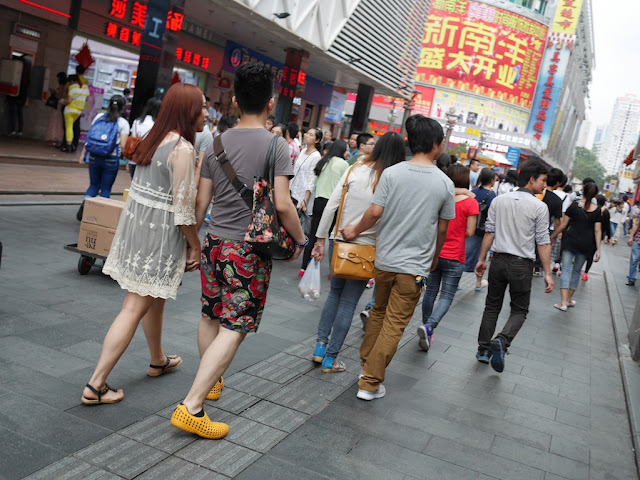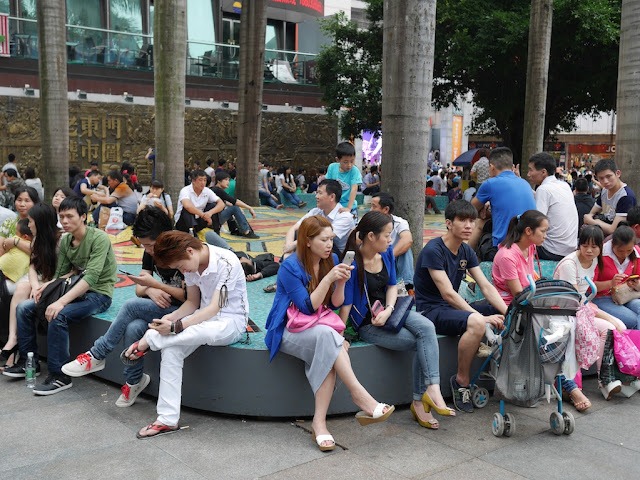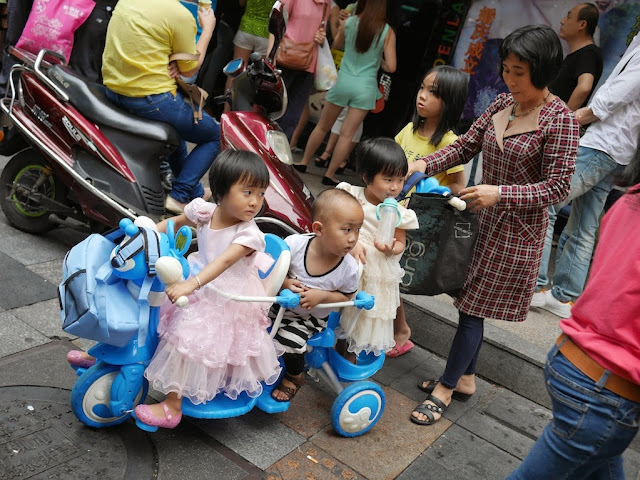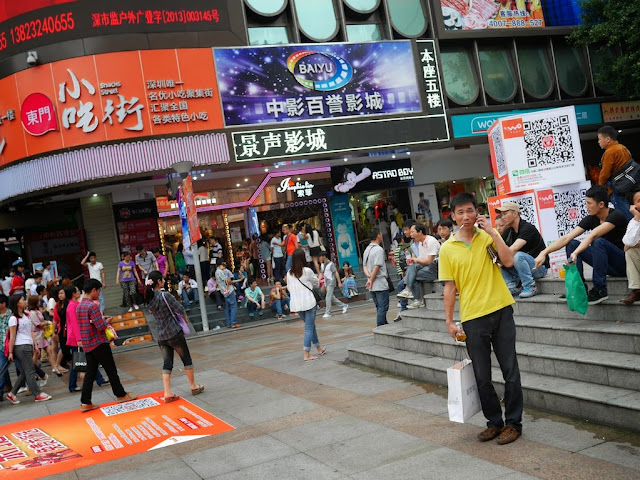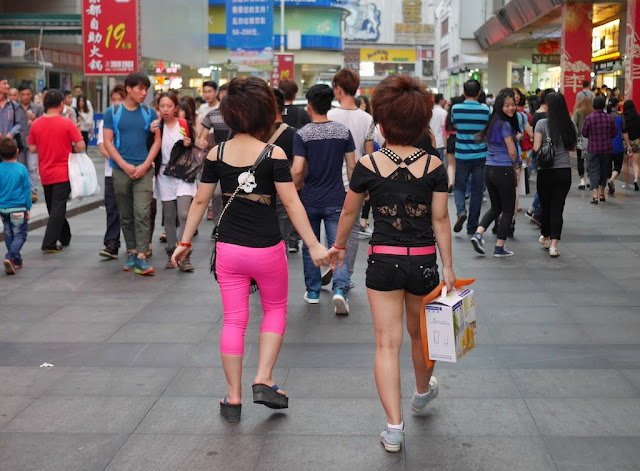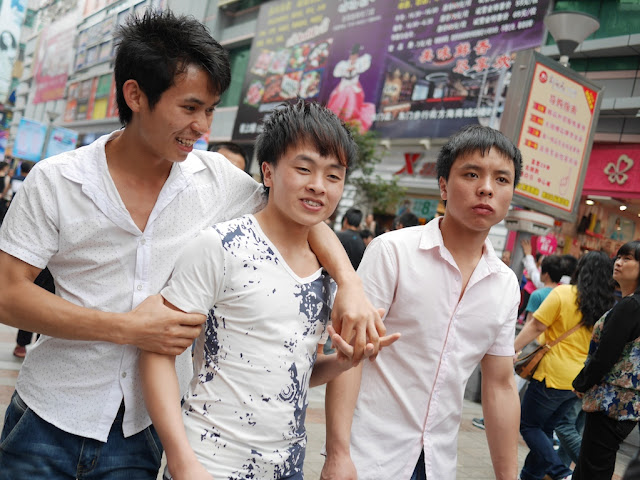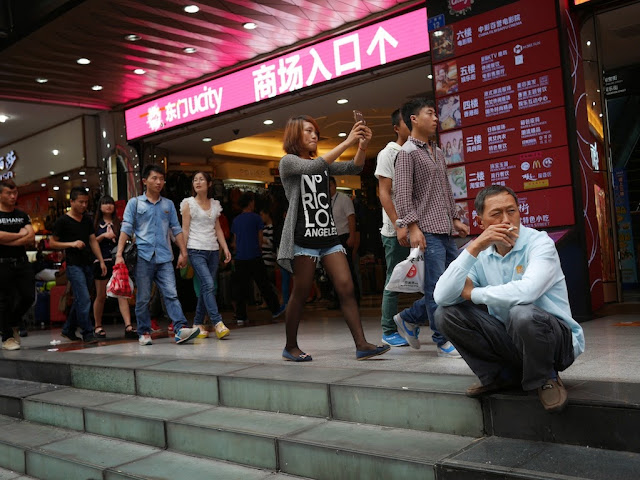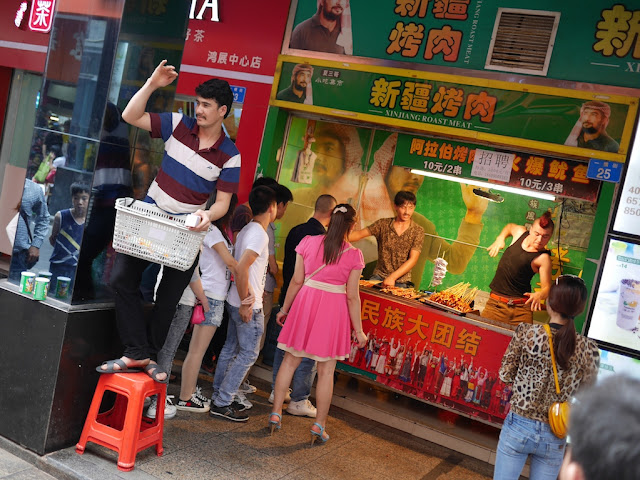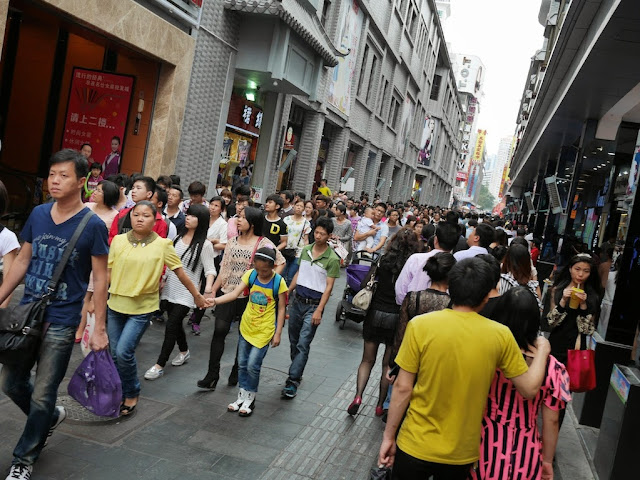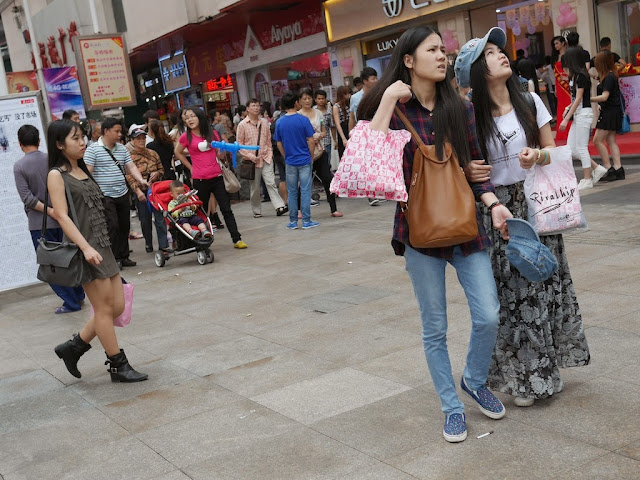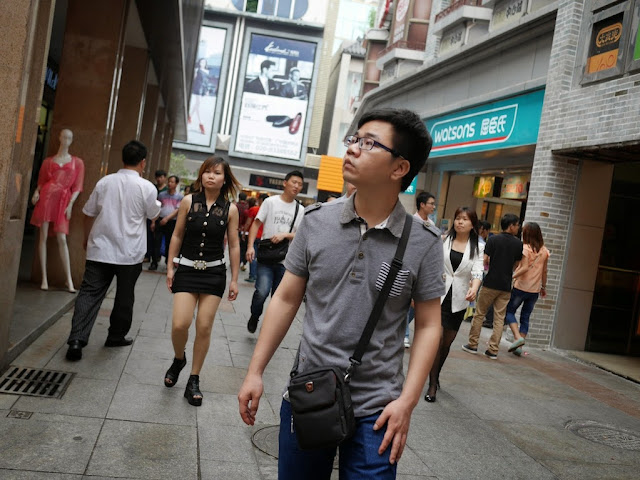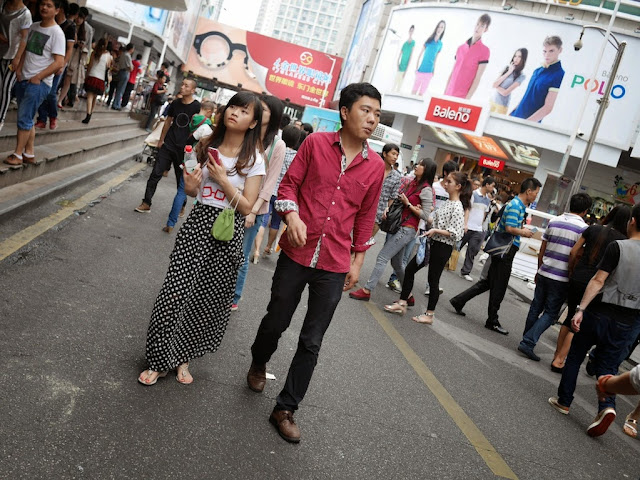Wednesday, May 14, 2014
Monday, May 12, 2014
A Mother's Day Promotion in China with WeChat and QR Codes
Posted by
Brian Glucroft
at
11:58 PM
Unlike a Mother's Day several years ago in Zigong, Sichuan province, I didn't see any fashion shows yesterday in Hengyang, Hunan province. However, I saw some signs of Mother's Day at a few shopping centers and stores. One especially caught my eye because of its use of technology and flowers.
Outside of a shopping center with small clothing stores primarily targeting younger women, there was a Mother's Day promotion. In return for a flower and other possible gifts to give one's mother, people were asked to do two things.
One, people captured an image of a QR code through the mobile phone app for WeChat--called "Weixin" in China.
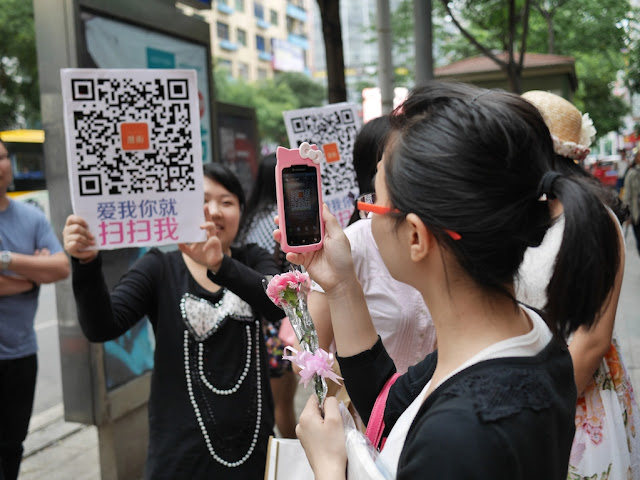
After the code was read, people found that they were now following the shopping center's WeChat account.
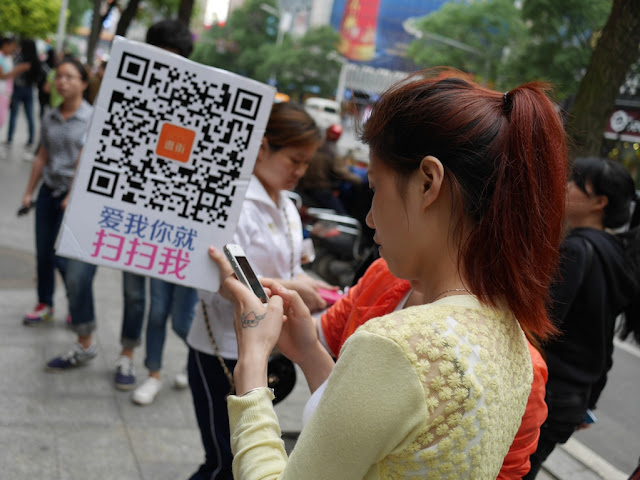
Two, people were also asked to write their name and phone number on a pad of paper.

During the time I was around, there was a constant stream of people going taking the two steps for receiving a free gift (sometimes receiving it in the middle if they signed their names first)--a possible sign of many things, including the popularity of smartphones and WeChat in China. It's definitely not the first instance of using QR codes and WeChat as part of a marketing campaign in China though. The use of a pad of paper instead something more high-tech for collecting names and numbers also raises some interesting issues.
Finally, although I didn't follow their WeChat account or provided my name and number, one of the people working for the promotion gave me a flower and a mousepad.
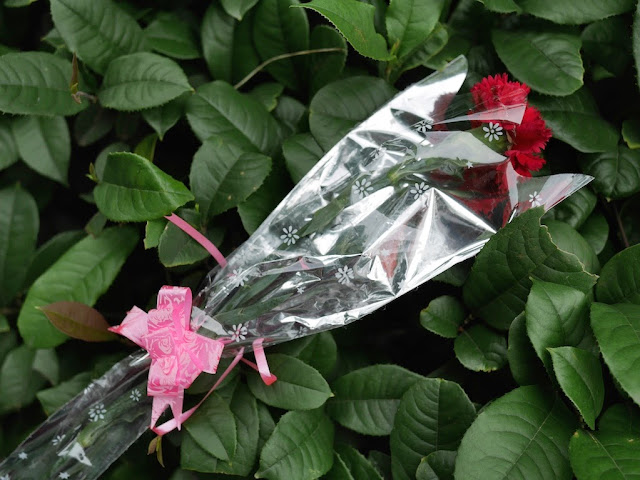
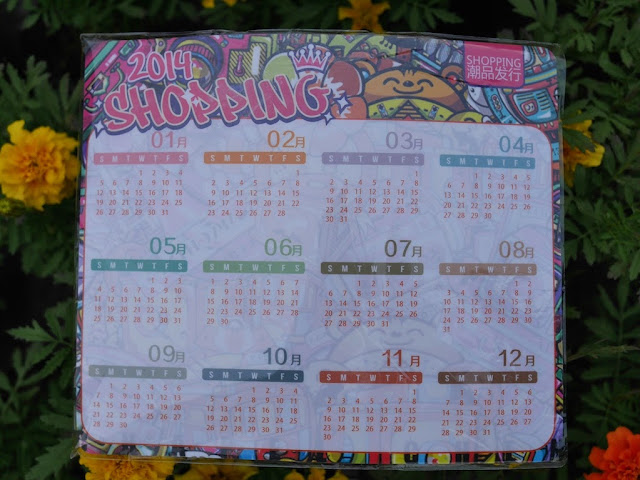
Since my mother is nowhere near Hengyang, I was not able to give her the gifts as intended. Instead, I passed them on to people I later met. Perhaps they made their way to other mothers.
Outside of a shopping center with small clothing stores primarily targeting younger women, there was a Mother's Day promotion. In return for a flower and other possible gifts to give one's mother, people were asked to do two things.
One, people captured an image of a QR code through the mobile phone app for WeChat--called "Weixin" in China.

After the code was read, people found that they were now following the shopping center's WeChat account.

Two, people were also asked to write their name and phone number on a pad of paper.

During the time I was around, there was a constant stream of people going taking the two steps for receiving a free gift (sometimes receiving it in the middle if they signed their names first)--a possible sign of many things, including the popularity of smartphones and WeChat in China. It's definitely not the first instance of using QR codes and WeChat as part of a marketing campaign in China though. The use of a pad of paper instead something more high-tech for collecting names and numbers also raises some interesting issues.
Finally, although I didn't follow their WeChat account or provided my name and number, one of the people working for the promotion gave me a flower and a mousepad.


Since my mother is nowhere near Hengyang, I was not able to give her the gifts as intended. Instead, I passed them on to people I later met. Perhaps they made their way to other mothers.
Friday, May 9, 2014
An Easy-to-Identify Knockoff Chanel Shirt in China
Posted by
Brian Glucroft
at
11:56 PM
Knockoffs of well-known international clothing brands are a far more common sight in China than imitations of well-known international hotel brands. Just how common is not simple to pin down though. Depending on the degree and quality of the imitation, it can be challenging to identify knockoffs based purely on their appearance, especially if one is not familiar with the brands. For example, today in Hengyang, Hunan province, I saw someone wearing what appeared to be a Chanel shirt.
After a quick check of Chanel's website, I now see that the shape of the two interlocked letters in the logo seems less circular than the interlocked letters in Chanel's standard logo, but I am still not sure whether the shirt is a knockoff or not. I would not be surprised if Chanel could provide a very quick answer.
In contrast, there are other shirts I feel confident labeling as knockoffs even without checking a website or consulting a fashion expert. For example, also today in Hengyang, I saw someone wearing a shirt with what is clearly only an imitation of Chanel's brand.
As everyone knows, the interlocked letters in Chanel's logo don't have rounded ends. Sometimes it is so easy.
After a quick check of Chanel's website, I now see that the shape of the two interlocked letters in the logo seems less circular than the interlocked letters in Chanel's standard logo, but I am still not sure whether the shirt is a knockoff or not. I would not be surprised if Chanel could provide a very quick answer.
In contrast, there are other shirts I feel confident labeling as knockoffs even without checking a website or consulting a fashion expert. For example, also today in Hengyang, I saw someone wearing a shirt with what is clearly only an imitation of Chanel's brand.
As everyone knows, the interlocked letters in Chanel's logo don't have rounded ends. Sometimes it is so easy.
Thursday, May 8, 2014
Taking the Dog for a Run in Hengyang
Posted by
Brian Glucroft
at
11:08 PM
Seen on a bridge over the Xiang River in Hengyang:
Some points perhaps worth making:
1. This is not at all a common sight for me.
2. The dog was running at a decent speed for its size and, as seen in the photo, leading the way. Sorry, no video.
3. The dog was not pulling the motorbike.
Some points perhaps worth making:
1. This is not at all a common sight for me.
2. The dog was running at a decent speed for its size and, as seen in the photo, leading the way. Sorry, no video.
3. The dog was not pulling the motorbike.
Monday, May 5, 2014
Brand Names Can Set Expectations Even for Known Imitators in China
Posted by
Brian Glucroft
at
11:12 PM
In an article in The New York Times about the imitation of well-known international brand names in China's hotel industry (HT Helen Gao), Julie Weed shared a viewpoint from one international hotel:
Surely this effect is not limited to only hotels and mobile phones. And it is one reason why customers' being able to distinguish genuine from imitation isn't necessarily enough for a company to avoid losing business to its imitators.
“We do take steps to protect our brand, " said Sian Griffiths, director of communications for the Hong Kong Peninsula Hotel. “However, we also feel that our target customers are sufficiently discerning not to confuse the Peninsula-branded hotels with the copycats.”But an example Weed shares shows why The Peninsula Hotels may still have reason for concern:
Li Quan, a pharmaceutical sales representative traveling on business this week in Shanghai, said he knew the Hengsheng Peninsula International Hotel was not part of the international Peninsula chain, but believed it would be an “upscale hotel because of the obvious name resemblance.”Using similar logic as Li, people may also buy mobile phones, such as the iPncne I saw in Yinchuan, even if they are recognized as imitating a well-known international brand. Several years ago in a post about how local rates, fashion, and fakes are relevant to mobile phones in China I shared a relevant example from Shuolong, Guangxi:
He was disappointed to find “so-so facilities and worse-than-average service,” and said that some domestic hotels tried “to boost their value and brand awareness by sharing names with other reputable hotel chains so they can achieve a make-believe attachment to those hotels.”
Her dream phone was a Nokia. Not because of any concerns regarding fashion but because she believed it would be very reliable and rugged. However, a real Nokia phone was not a possibility given their relatively high price so she wanted to get a fake Nokia phone since it would be cheaper.The hotel and mobile phone examples show if brand X's name is used in some way by an known imitator in China, people can have an expectation that an X-ish level of quality or type of experience will be delivered. If the imitator is then chosen, those expectations may positively color later perceptions, or they may draw attention to any shortcomings. That brand names can have such powerful carryover effects for known imitators is yet another sign of their value.
Unlike many other examples I've seen of purchasing fake products, her choice of a fake Nokia versus other relatively inexpensive options did not appear to be driven by how others around her would perceive the product. It was about her own internal expectations for what the product could provide to her based on its name - even though it would be a fake.
Surely this effect is not limited to only hotels and mobile phones. And it is one reason why customers' being able to distinguish genuine from imitation isn't necessarily enough for a company to avoid losing business to its imitators.
Two Brief Encounters in Hengyang
Posted by
Brian Glucroft
at
9:00 AM
After I took a photo of an architecturally intriguing department store while I waited at an intersection in Hengyang, Hunan province, someone behind me enthusiastically said in English, "Beautiful!"
I turned around and saw a man on a motorbike smiling at me. After a brief friendly chat, he happily agreed to pose for a photograph:
When the light turned green he rode off with a hearty "Goodbye".
A little more than 10 minutes later as I was walking on a sidewalk, a college student I hadn't noticed before approached me and said hello. Without any prompting from me, he then shared that he felt pleased about having just earned money for handing out flyers. I found out he made 40 yuan (about US $6.40) for 6 hours of work--less per hour than the amount earned by two college students I met a year and a half ago in Hunan's capital, Changsha, who had similar part time jobs (see here and here). I would not be surprised if the going rate was lower in the smaller city of Hengyang, though, and I have met many students elsewhere in China who would consider his part-time job a good deal. So I congratulated him, and he then headed to a bus stop to take a bus back to his university.
These two brief experiences made my Saturday in Hengyang a little more interesting and touch on themes, some more obvious than others, I have raised before. And as much as the experiences were unexpected, neither was unprecedented, and they are consistent with others I have had in China.
I turned around and saw a man on a motorbike smiling at me. After a brief friendly chat, he happily agreed to pose for a photograph:
When the light turned green he rode off with a hearty "Goodbye".
A little more than 10 minutes later as I was walking on a sidewalk, a college student I hadn't noticed before approached me and said hello. Without any prompting from me, he then shared that he felt pleased about having just earned money for handing out flyers. I found out he made 40 yuan (about US $6.40) for 6 hours of work--less per hour than the amount earned by two college students I met a year and a half ago in Hunan's capital, Changsha, who had similar part time jobs (see here and here). I would not be surprised if the going rate was lower in the smaller city of Hengyang, though, and I have met many students elsewhere in China who would consider his part-time job a good deal. So I congratulated him, and he then headed to a bus stop to take a bus back to his university.
These two brief experiences made my Saturday in Hengyang a little more interesting and touch on themes, some more obvious than others, I have raised before. And as much as the experiences were unexpected, neither was unprecedented, and they are consistent with others I have had in China.
Saturday, May 3, 2014
Another Nighttime View of the Xiang River
Posted by
Brian Glucroft
at
11:10 PM
A Xiang River scene from tonight in Hengyang, Hunan province:
For a nighttime view of the Xiang River elsewhere in Hunan, see the earlier post here.
For a nighttime view of the Xiang River elsewhere in Hunan, see the earlier post here.
Friday, May 2, 2014
Thursday, May 1, 2014
A Crowded Labor Day in Shenzhen's Dongmen
Posted by
Brian Glucroft
at
11:39 PM
Today marked the beginning of the Labor Day (May Day) national holiday in China. On pedestrian streets in Shenzhen's Dongmen (东门) area the crowds were dense as many people shopped, ate, or labored. Almost two years ago, I shared photos of outdoor scenes and fashion for sale at Dongmen. For a current look at Dongmen and a contrast with another Labor Day I spent two years ago in Yinchuan, Ningxia, here is a set of outdoor photos from there today which capture more slices of life in China:
Subscribe to:
Posts (Atom)



